Cold water swimming: Do the benefits really outweigh the risks?
Plunging into icy water in winter seems crazy but its many devotees swear by its health benefits — however, experts warn there’s a risky flipside to this growing trend.
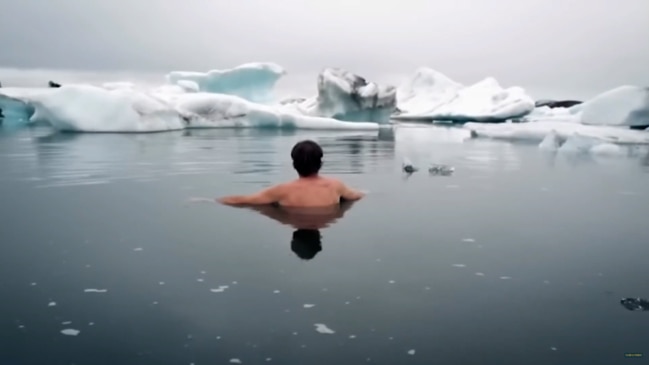
Victoria
Don't miss out on the headlines from Victoria. Followed categories will be added to My News.
Jumping into freezing water in the middle of winter might seem like a crazy idea, but the so-called cold plunge has become increasingly popular.
Those who regularly brave the cold claim the benefits include enhanced blood circulation, reduced inflammation, weight loss, improved mental health and enhanced immunity.
But experts say evidence to support these benefits is “scant” and warn shocking the body with cold water can lead to “significant” cardiac risks, hypothermia and even drowning.
Cold water immersion, known as a cold plunge, is the practice of submerging in water that is usually between 5 and 15C for five to 15 minutes.
It can take place in a range of settings including gyms, wellness centres, in natural water environments such as rivers, lakes or oceans, or at home in an ice bath or shower.
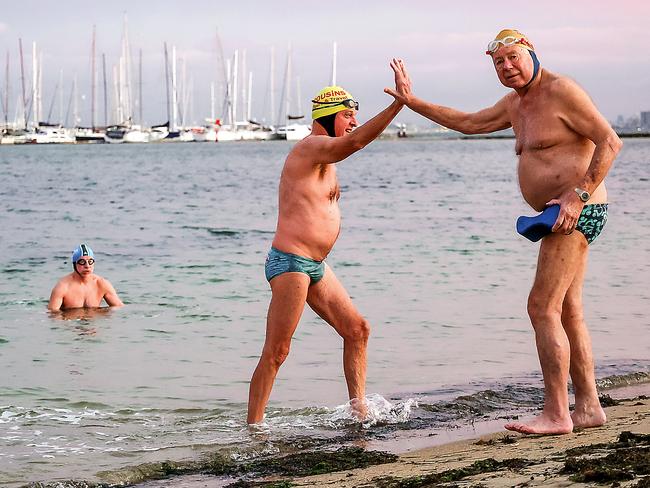
Professor of neuroimmune pharmacology from the University of Adelaide, Mark Hutchinson, said people in cold climates like Scandinavia, Japan, Russia and Canada had been practising cold water therapy for centuries.
He said Dutch motivational speaker and extreme athlete Wim Hof, also known as The Iceman, as well as influencers on social media, had popularised the activity.
Professor Hutchinson said cold plunges could bring mental health benefits due to learned optimism.
“It’s putting yourself through a stressor that is otherwise unpleasant, but learning how to control that,” he said.
He said there was a clear benefit of exercising thermoregulation – being able to maintain a steady internal body temperature.
“Our physiology is not exposed to a very great range of temperatures. And so the ability of our blood circulation system to actually undergo constriction and dilation to healthy normal extremes is not activated very much,” he said.
“The way that I think about the cold and even the heat exposure in saunas, you’re intentionally creating a dynamic switch between on and off for your body to literally activate the systems that turn on when they need to turn on, and turn off when they need to turn off.
“Just like when you have a sprain and you put ice on the area, we know that the cold can also decrease inflammation.”
But Professor Hutchinson warned plungers needed to “treat water as a dangerous thing”.
“If you’re going to run a marathon, you don’t go and run a marathon on day one. You work up to it. You do a 1k, a 5k, a 10k,” he said.
“People need to realise that this is actually an extreme physiological response. And so therefore, you need to adapt to it.
“Everyone’s sensitivity to cold water is going to be different.”
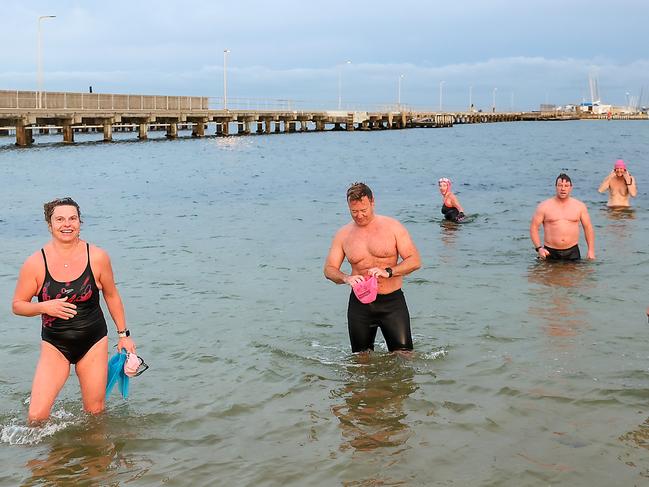
Senior lecturer in human physiology at Griffith University, Dr Llion Roberts, said there was some quality scientific evidence to support cold exposure, but most people felt the placebo effect of the exposure.
“The most widely reported benefit is based on the feeling of warm blood returning to cold limbs and/or the cold temperature having numbed immersed areas,” he said.
“Those who would benefit are largely those who would enjoy them as there is a huge amount of satisfaction factor.
“An extremely relevant study conducted a few years ago saw that undertaking such a plunge was no better than a placebo – emphasising the power of the mind and believing in something.”
Dr Roberts said cold water immersion was commonly used by elite athletes who were always looking for the “one per centres” that would help with recovery.
“Regular use of cold plunging after endurance exercise has some good evidence to support enhanced adaptation to endurance exercise, however, the opposite is true for strength/resistance training,” he said.
Senior lecturer in physiology from the University of Melbourne, Dr Joseph Rathner, said drowning, hypothermia and cardiac arrhythmia were the greatest hazards associated with cold-plunges.
“Sudden immersion in cold water will activate the sympathetic nervous system, causing a rapid increase in heart rate,” he said.
“There have been some reports of physical damage to heart muscle due to cold exposure. Cold shock triggers a loss of breathing control.
“Experienced swimmers are less prone to the dysregulation of breathing reflex, so the risk of drowning in this way is reduced with experience.”
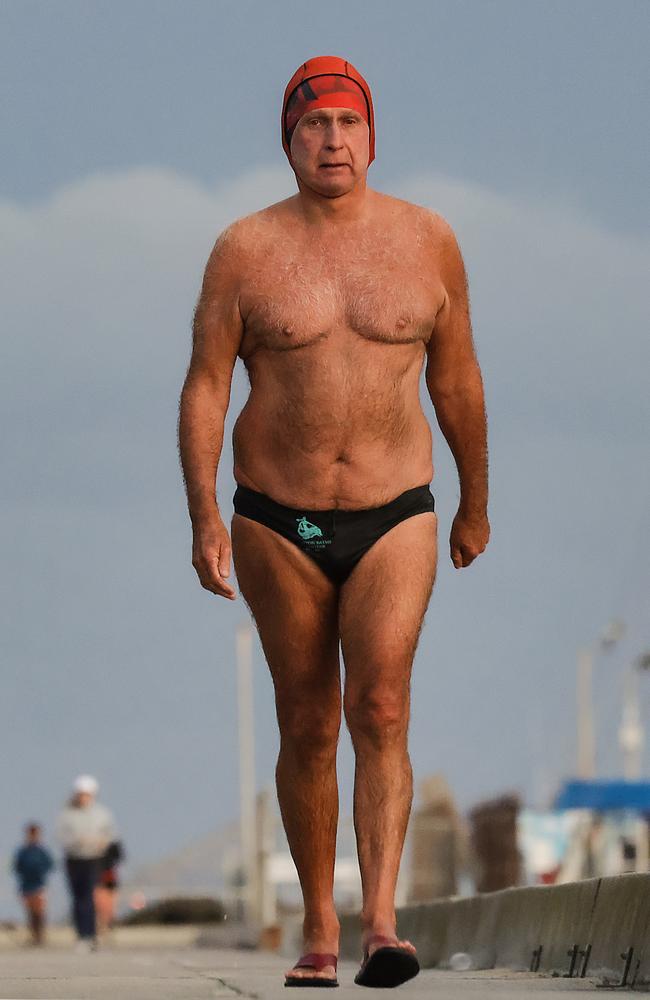
English woman Kellie Poole died from an undiagnosed heart condition triggered by a cold water immersion therapy session in a river in Derbyshire, England, in 2022.
The 39-year-old developed a sudden cardiac arrhythmia after entering the water, which was 10.7C. She complained of a headache then fell forward and later died.
Dr Rathner said evidence to support the touted health benefits of cold plunges was “weak”, and that all of the perceived benefits can instead be explained by activation of the sympathetic nervous system, also known as the “fight-or-flight” response.
“It is not the swim itself that is beneficial, and other ways of evoking similar reflex responses will achieve the same or better outcomes,” he said.
“Exercise is known to have all the same benefits, with much stronger evidence, and much fewer risks.”
He said sympathetic nervous system activation had been shown to have anti-inflammatory effects.
It also leads to an increased release of noradrenaline – which is associated with a greater sense of wellbeing, as well as improved learning and concentration.
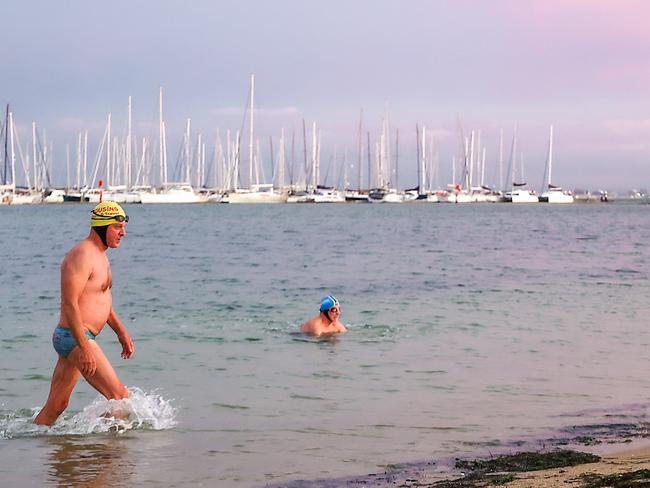
The Royal Life Saving Society Australia recommends those undertaking cold water immersion identify any underlying health conditions that may increase their risk of adverse reactions.
Pregnant women and people with chronic or serious illness, or that are on certain treatment programs or medications and/or with heart problems, circulatory issues, high blood pressure, auto-immune disorders, or increased sensitivity to cold, are at an elevated risk.
They recommend participants are trained in how to regulate their breathing during a plunge to minimise the risks associated with shock response, and undertake an adequate warm up and warm down to reduce the risk of hypothermia and injury.
They also say cold water exposure should begin with shorter durations and gradually progress as the participant’s tolerance increases.
“In the context of cold plunge pools, the neck and head should remain out of the water at all times,” they wrote.
“A temperature range of 10-15C is generally considered safe for most individuals. Colder temperatures can be used but this increases the risk of extreme stress on the body.”
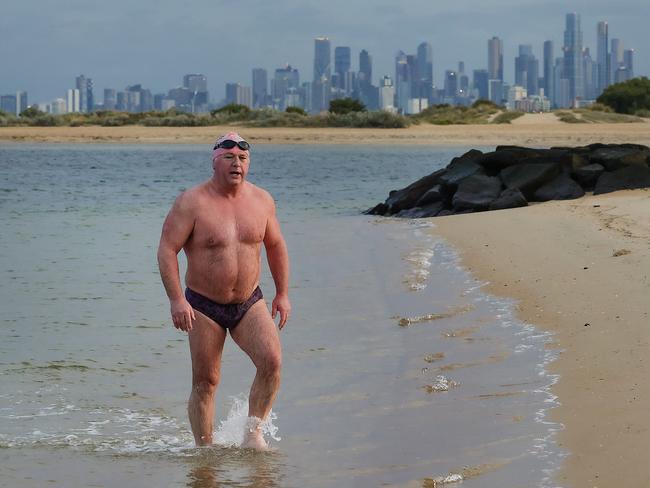
Greg Wallace, 59, has been swimming with the Brighton Icebergers for more than 10 years.
On any one day there can be up to 70 people taking part in the cold swim at Brighton, starting from 5am.
“There’s men and women, mainly over 40 but some as old as mid to late 80s, that are all living locally that come for a morning swim,” Mr Wallace said.
“We usually swim anywhere from 800m to 1.5k. Water temperatures can drop right down to 8C in winter.”
Mr Wallace takes part in the swim five to seven times a week.
“There is a really strong community aspect to it now. It’s something fun to do and has assisted me in my health and fitness,” he said.
“I think there’s unbelievable physical and mental health benefits. Being in the natural environment is particularly stimulating – it invigorates you for the whole day.
“The cold water can take your breath away. So it’s important to condition yourself and slowly build up your exposure. I usually recommend starting in February when the water is nice and warm.”




